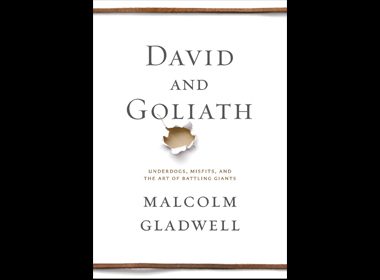The RD Interview: Talking Underdogs With Malcolm Gladwell
Bestselling author Malcolm Gladwell on his new book David and Goliath and why little guys can still take on titans and win.

Give us a digest version of David and Goliath: Underdogs, Misfits and the Art of Battling Giants.
We all assume that if you’re weak and poor, you’re never going to win. In fact, the real world is full of examples where the exact opposite happens, where the weak win and the strong screw up. I interviewed the president of Goldman Sachs, Gary Cohn, for the book. He makes a kajillion dollars. Then he starts to talk about his childhood and getting kicked out of schools, and his mom never thought he would graduate.
When the weak win, however, doesn’t power shift to them? Take Cohn. He certainly could be considered a powerful man.
I see what you mean, but my favourite chapter in the book is about a leukemia researcher who had an appalling childhood. He’s a deeply troubled figure who managed to create something of incalculable value in the world. But there was no danger he’d become Goliath. He’d never become big and strong and tough and arrogant. With Gary Cohn, you realize that even as he’s accomplished all these things, some part of him is still that terrified, vilified kid.
So even if your fortunes change, your core identity doesn’t.
You can do extraordinary things, but the bittersweet nature of the underdog story is that you carry around the scars with you for the rest of your life.
Do you see yourself as an underdog?
I’ve had the most untraumatic life a human being can have. But I’ve always been drawn to those who have had far more complicated histories.
You once said that we are always attracted to charismatic leaders, even though things often wind up badly. Why do you think that is?
Mistake No. 1 is that we are interested in charisma. We are also overly in love with certainty. We want someone who can stand up and give us very clear direction, even though with most of the problems we face, there is no clear direction. In a perfect world, we would be happier with more thoughtful, introverted types. But we revert to our caveman selves, and we want the big, strong giant who can swing the club harder than anybody else.
Do you think powerful business figures can be moral leaders?
I’ve written about Oskar Schindler, who, during the Second World War, saved over a thousand Jews by pretending they were useful in making weapons for the Third Reich. Schindler was a terrible businessman. He didn’t put his business first; he put people first. I think of Steve Jobs as a great man but not a great moral man.
You predict that in 50 years no one will remember Steve Jobs, but they’ll remember Bill Gates.
I said that because Gates has decided to become the greatest philanthropist the world has ever seen. In five years, people will have difficulty remembering Microsoft Office, but if Gates cures malaria, there will be statues of him in every major city in the Third World.
What’s the one thing you would like readers to take away from your book?
That the greatest things in the world come from suffering. It ought to give us solace.



